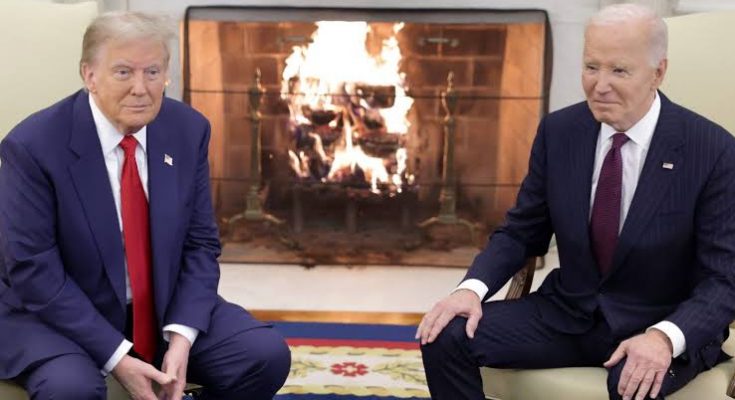WASHINGTON — In a historic gesture of reconciliation and commitment to democracy, President Joe Biden hosted President-elect Donald Trump at the White House on Wednesday, marking a significant moment in the often contentious relationship between the two leaders. The meeting in the Oval Office, the first between Biden and Trump since their June debate, was a powerful reaffirmation of the presidential transition tradition that was skipped in 2020 when Trump refused to concede.
President Biden, addressing reporters as cameras briefly captured the exchange, underscored the importance of a seamless transfer of power. “I look forward… to having a smooth transition. We’ll do everything we can to make sure you’re accommodated, what you need,” Biden stated with an air of formality and optimism. Trump, in his own remarks, acknowledged the unique challenges of politics but expressed appreciation for Biden’s commitment to a smooth process. “I appreciate very much the transition that’s so smooth. It will be as smooth as it can get, and I very much appreciate that,” he said.
This event represented a poignant return to 1600 Pennsylvania Avenue for Trump, who had last visited four years earlier at the end of his first term. He arrived at Biden’s invitation, marking a dramatic shift from the previous transition when, in the aftermath of a divisive election, Trump had refused to invite Biden to the White House. In a stark contrast to 2020, Biden extended the olive branch denied to him, setting a new precedent of restoring civility in presidential transitions.
A Tumultuous Political Background
The meeting came against a backdrop of years of acrimony. Trump, who decisively defeated Biden in the 2024 election, had spent much of Biden’s term sharply criticizing his policies, particularly on issues such as border security, economic growth, and international diplomacy. Meanwhile, Biden had made no secret of his concerns regarding Trump’s impact on American democracy, even going so far as to label him a threat to the nation’s stability in previous speeches. Despite these deep-seated differences, Biden’s invitation was extended as a gesture of unity, and Trump accepted it with a tone of gratitude.
For Biden, whose withdrawal from the 2024 presidential race earlier in the year was met with mixed public reactions, the meeting was likely complex. His decision to step down after a series of challenging debates against Trump in July brought questions about his stamina and readiness for a second term to the forefront of public discourse. Yet Biden’s commitment to uphold the traditional transition process highlights his longstanding dedication to national stability and continuity.
Substantive Discussion and National Security Concerns
The two-hour meeting, attended by current White House Chief of Staff Jeff Zients and Trump’s incoming Chief of Staff Susie Wiles, covered critical national and international issues. According to White House Press Secretary Karine Jean-Pierre, the leaders engaged in a “substantive exchange of views” on topics ranging from domestic policy to pressing national security concerns. Biden reportedly emphasized the importance of continuity in government operations, particularly regarding Congress’s to-do list for the lame-duck session, which includes funding proposals and disaster relief measures.
National Security Advisor Jake Sullivan added that Biden reaffirmed his belief in maintaining strong support for Ukraine. “President Biden reinforced his view that the United States standing with Ukraine is in our national security interest,” Sullivan remarked, pointing to the necessity of a robust European alliance to counteract threats from aggressive regimes. Sullivan noted that Biden linked the stability of Europe with U.S. security interests, citing the devastating consequences of global conflicts that have historically embroiled the United States.
Restoring a Tradition of Civility
Political analysts have noted the symbolic importance of this meeting. Wayne Lesperance, president of New Hampshire’s New England College, described Biden’s invitation as a “remarkable gesture” that not only legitimizes Trump’s return to the presidency but also strengthens a vital democratic practice. “President Biden’s decision to welcome President-elect Trump to the White House is a tribute to normalcy in the presidential transition process,” Lesperance stated. “What was denied to Joe Biden following his election is being restored to Biden’s credit. It’s a gesture that hopefully sets a standard for peaceful transitions moving forward.”
This encounter between the incumbent and incoming presidents reflects a broader, longstanding tradition—albeit one occasionally interrupted by periods of political tension—that underscores the resilience of American democracy. The peaceful handover of power between leaders, regardless of political rivalry, remains a hallmark of U.S. governance. Notably, Biden’s invitation mirrors the graciousness shown by President Obama when he welcomed Trump in 2016, despite their ideological divides. Obama’s words during his 2016 meeting with Trump, “If you succeed, then the country succeeds,” resonate again in Biden’s outreach.
The presence of other high-profile political figures has further emphasized a spirit of national unity. Biden, Trump, Vice President Kamala Harris, and Trump’s running mate, Senator JD Vance of Ohio, were seen side by side at the September 11 commemorative event in New York earlier this year. Such rare displays of solidarity among political opponents have resonated with the public and illustrate the enduring impact of shared national values.
A Closing Chapter, An Open Door
As Trump prepares to assume the presidency once more, Biden’s actions have set the stage for a cooperative transition. The bipartisan effort aims to reinforce a legacy of civility, trust, and continuity within the highest office. While there is no constitutional requirement for outgoing and incoming presidents to meet, Biden’s initiative to restore the tradition sends a clear message: the democratic process, anchored in respect and cooperation, transcends individual differences.
Ultimately, this meeting not only marked the resumption of a tradition but also signified a commitment to the principles of American democracy, reminding the nation and the world that political rivalry does not preclude peaceful collaboration. The symbolic gesture and substantive discussions held in the Oval Office on Wednesday underscore the potential for unity amid division, paving the way for a respectful and orderly transition of power.




